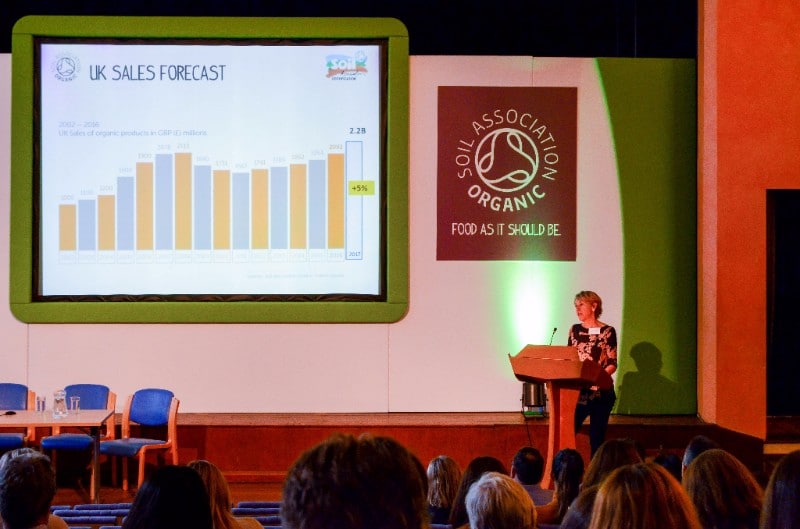At its annual Organic Trade Briefing on 19 September, the Soil Association confirmed that growth in the organic market is up 6.3% in the 52 weeks to 13 August, based on Kantar Worldpanel figures, with organic sales predicted to reach ‘new heights’ at £2.2 billion this year.
More than 130 guests attended the briefing, which focused on the ‘changing face of organic retailing’ and the consumer trends driving the data. The figures, presented by Finn Cottle, trade development, Soil Association Certification, showed London on top in terms of regional sales, with the south and south west following closely on its heels, as younger shoppers increasingly gravitate towards ‘ethically driven purchases’.
Ocado – the UK’s fastest growing organic retailer – was represented at the briefing by Kevin Hancock, senior trading manager, who said: “Organic at Ocado has grown by 16.2% in the last 12 months, and long may it continue. We strive to help our suppliers to grow with us and continue to develop products, allowing our customer base to further enjoy their organic lifestyle.”
The findings presented during the briefing also showed ‘provenance and values’ to be of greater importance to these consumers then low prices and discounts. Fresh produce, dairy and grocery are the categories attracting the most sales; the popularity of organic nut butters, fruit, energy bars, teas, cereals and free-from products are reported to be making a significant impact.
Speaking during a panel discussion, Dan Rusga, marketing director at Yeo Valley, said: “Consumer attitudes are changing, with the importance of quality products and traceability now at the forefront of producer, brand and retailer strategies … Organic isn’t a badge. Consumers easily see through inauthenticity. Delivering products that continue to meet consumer needs and values, which match our own, gives us a unique opportunity to keep the organic market growing.”
“Organic isn’t a badge. Consumers easily see through inauthenticity”
During a presentation about the role of blockchain technology from Jessi Baker, founder of Provenance, statistics were presented which highlighted that ‘72% of UK millennials are willing to pay more for products from companies committed to positive social and environmental impact’, translating into eight in ten consumers checking the origin of a product. Rusga added: “Trust is so important. It’s what sets you apart as a brand and as a retailer. I think it will become especially important for new brands.”
The labelling of produce is equally important, according to Cottle: “There are now customers who look behind the label and want to know exactly where it was produced and where it was packed,” she said, adding that there is an opportunity to be seized by fresh food manufacturers in increasing their sales by labelling their produce as ‘British’. Hancock supported this advice, advising brands: “Have it in your title. It is something that you want to make stand out.”
The audience also heard from panel contributor Karen Newby, founder of Alchemy Organic Super Blends, who commented on the importance of including the word ‘organic’ itself in the title of a product: “I felt that this was a really important part of building a brand from scratch with integrity and full transparency … it gave the product that purity.”











